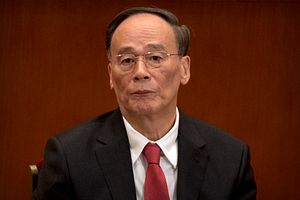China’s former anti-corruption czar, Wang Qishan, has just returned to the political stage.
On January 29, the Hunan Province People’s Congress announced that Wang, together with other 117 members, has been appointed as a deputy to the National People’s Congress (NPC), China’s national legislature.
Wang, 69, has reached the age of retirement for China’s top officials, according to the unwritten rules of the Chinese Communist Party (CCP). Thus, after the CCP reshuffled its leadership during the 19th Party Congress last October, Wang stepped down from both his principal positions: head of the Central Commission for Discipline Inspection (the CCP’s highest internal-control institution) and member of the seven-man Politburo Standing Committee (China’s highest decision-making body).
However, there have been widespread rumors that Wang — who had been in charge of the grand anti-corruption campaign launched by Chinese President Xi Jinping since 2012 as Xi’s most important ally — would not leave China’s political stage so easily. Multiple oversea media outlets predicted that Wang would be appointed as China’s vice president or another important role at the annual meeting of the NPC in March.
The Hunan Province People’s Congress’ latest announcement has just added fuel to those rumors, since it’s extremely rare for a retired CCP high official to gain a seat in the NPC.
The latest development immediately caught media attention at home and abroad.
China’s local media outlets, although forbidden from analyzing the development by censors, simply highlighted Wang’s appointment by running the announcement as a headline, without adding any further explanation. The collective move by Chinese media further demonstrated the significance of Wang’s unusual appointment.
As The South China Morning Post noted, “In the past two decades, all top state officials, from presidents to ministers, as well as the party’s inner 25-member Politburo, have had seats in the NPC. At the same time, all outgoing and retiring top leaders have not stayed on for the NPC’s next session.”
Beijing-based political commentator Zhang Lifan told SCMP that the arrangement has “paved the way for Wang’s vice-presidency.”
“Wang is almost set to become a member of the NPC’s presidium,” Zhang said. “but Wang’s real power will remain to be seen – it depends on what Xi’s needs are.”
According to China’s Constitution, there is no age cap for either the president or the vice president, merely a minimum age requirement of 45.
As for the role of the vice president, Article 82 reads:
The Vice-President of the People’s Republic of China assists the President in his work.
The Vice-President of the People’s Republic of China may exercise such functions and powers of the President as the President may entrust to him.
Thus, the power of the future vice president, whether Wang or another official, will be totally decided by Xi.

































